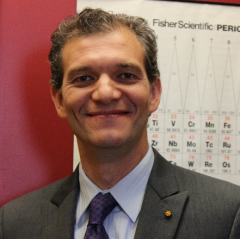Our research group works at the interface of chemistry, chemical engineering and catalysis to address outstanding issues in energy science, sustainability and green chemistry. Much of modern life materials are based on nonrenewable petroleum. We are active in two areas of research, biomass conversion and bio-inspired chemistry, to discover and develop new transformations and molecules that can serve as monomers for new materials and/or precursors to renewable liquid fuels.
In catalytic conversion of nonfood biomass, we have demonstrated novel methods to convert lignin into two high value phenols. These molecules can be used as monomers to make thermoplastics, precursors to aromatic compounds, and they can be deoxygenated further to high octane hydrocarbon fuels. An attractive feature of our lignin first approach is the preservation of the cellulose, which we have shown can be upgraded via catalysis to value added chemicals or fuel precursors.
In our bioinspired project, we have prepared metal oxo complexes and investigated their use in small molecule activation such as dioxygen and chlorite. In a recent example we discovered and characterized unusual valence tautomerization in manganese oxo corrole that affords upon addition of a proton or a Lewis acid reactivity that spans seven orders of magnitude. These findings illuminate how nature’s enzymes work and provide insight on how we as molecular engineers can design and prepare catalysts tailored for function much like nature does in metalloproteins.
A common theme in our research is catalyst design based on mechanistic understanding on the molecular scale. To determine reaction mechanisms and structure-function relationships, we study chemical kinetics, characterize intermediates, and employ state-of-the art spectroscopy under operando conditions. Graduate students and postdoctoral scholars in the group are given the freedom to tailor their own projects and are encouraged to collaborate with their colleagues in the lab as well as peers in other groups on campus with whom we share common scientific interests.
